Before I discuss the many benefits of phytoplankton for plant-based pregnancy it is important to know the concerns regarding plant-based diets for pregnant women. Although well-planned vegan and vegetarian diets have been recognised as safe and even beneficial for most women and their babies (1)(2) there is some concern of nutrient deficiencies in plant-based pregnancies, particularly in women that have poor knowledge of nutrient requirements during pregnancy. The key nutrients of concern on plant-based diets are omega 3 fatty acids (particularly EPA/DHA), iron, zinc, iodine, calcium and vitamin b12. (2) Although not as commonly discussed I have heard more recent concerns regarding choline (especially for vegans) (3) and Vitamin A (4). These nutrients are important for all mothers, irrespective of diet and are the prime reason prenatal supplements are so strongly encouraged in pregnancy.
What is Phytoplankton
Marine Phytoplankton is microalgae or microscopic plants that float in the upper layer of the ocean. They form the foundation of all oceanic food webs. Phytoplankton is similar to other microalgae like spirulina and chlorella but because it comes from the ocean, it has a slightly different nutritional profile and is likely the most nutritious of all the algae. The main point of difference is that it has a very high content of vegan EPA & DHA Omega 3 as well as being a significant source of vitamin b12. Vitamin b12 is arguably the only nutrient not found in adequate amounts in plant-based foods. In addition to this, phytoplankton also contains 75+ essential nutrients and 10 natural vitamins including b12. It also acts as a prebiotic and contains a beneficial form of fibre called beta-glucan. The phytoplankton I use and recommend is Phytality https://phytality.com.au/
Why Phytoplankton is good for plant-based pregnancy
EPA/DHA Omega 3: There are many different forms of Omega 3. The main types of omega 3 are ALA, EPA and DHA. ALA (found only in plants) must be converted into EPA in order to make DHA which is the form our body uses most often however conversion rates are often low, especially in pregnancy and therefore nutritional intake is recommended. EPA into DHA is used to assist in baby brain and eye development and has also been shown to help prevent preterm labour (8), increase birth weight (9)and decrease the risk of postnatal mood disorders (10). Although the dietary level of omega 3 for pregnant women is not well established, it is likely high than non-pregnant women (5) it is difficult for all pregnant women to obtain enough DHA in their diet as seafood consumption is restricted to just twice a week to avoid toxicity and mercury poisoning, thus all women are advised to supplement irrespective of diet (5). Furthermore, vegan women in pregnancy have been found to have the lowest conversion rates to DHA and so need adequate supplementation in pregnancy (6). 1g serve of phytoplankton offers about 67mg of omega 3 oils however due to its complex range of other nutrients, absorption of the omega 3 increases to about 200mg of omega 3 oils which is an equivalent amount found in fish, krill and algae oils. In addition, you may have heard that it is necessary to keep your fish oil in the fridge to reduce the chance of oxidation. Unlike extracted oils (fish, krill and algae) the omega 3 is safely enclosed within the cell wall of the phytoplankton making them stable, pure and highly effective.
Choline: Recent media attention has been given to choline and its role in pregnancy. Choline is a type of b vitamin that is beneficial for removing fat stores in the liver and has been shown to produce life long cognitive benefits in the infant (10) It has been suggested that vegan/plant-based women are most at risk for choline deficiency in pregnancy due to the idea that although plant foods do contain choline, they contain much less than animal foods (eggs are the highest source). Despite not having adequate evidence to support choline deficiency in pregnant vegan women (deficiency is rare) and other studies confirming no increased benefit of choline in pregnancy above 400mg (which is considered a moderate amount) (11) choline is still fairly new nutrient discovery and therefore many prenatal vitamins fail to add choline to their formula. Phytoplankton is a natural source of choline, making it a more complete prenatal alternative.
Multivitamin/Prenatal. Although calorie requirements do not increase significantly in pregnancy, micronutrient and protein requirements increase, making improved diet quality and supplementation necessary for a healthy pregnancy. Phytoplankton is considered gram for gram to be one of the most nutrient-dense whole foods on the planet offering over 75 different lipids (fats), minerals -including iron, zinc magnesium and some iodine) vitamins (including natural folate and b12) and other essential nutrients. Phytoplankton also contains high levels of antioxidants such as lutein and zeaxanthin (pre cursers to vitamin A). Phytoplankton is also a full spectrum protein with all essential amino acids. All nutrients occur in a natural wholefood structure and due to the small microscopic cell size of phytoplankton, it allows for very high nutrient absorption. Synthetic vitamins and minerals have a much poorer absorbability. The production process of synthetic nutrients is very different from the way plants create them. So despite having a similar structure, the body may react differently to synthetic nutrients (13) This is because when you eat food, you’re not consuming single nutrients, but a whole range of vitamins, minerals, co-factors and enzymes that work together and allow for optimal use and absorption by the body. Without these additional compounds, synthetic nutrients are unlikely to be used by the body in the same way as their natural counterparts (14).
Vitamin B12: Due to current agricultural practices, our soils lack sufficient vitamin B12 and therefore it is extremely difficult to get adequate B12 on a plant-based diet. That is why it is important for all plant-based eaters to include a B12 supplement of some kind. Consumption of B12 is even more important in pregnancy as vitamin b12 works with folate to prevent neural tube defects like spina bifida. B12 is also important for healthy nerve cells and blood cells and the production of DNA in all cells. Deficiency of vitamin b12 in pregnancy leads to preterm birth and low birth weight (15). The recommended intake of vitamin B12 in pregnancy is 2.6mcg which further increases to 2.8mcg during lactation. Phytoplankton is one of the only vegan sources of vitamin B12. A 1g serving of phytoplankton will provide 2mcg of vitamin b12 in a highly absorbable natural state. A double serving of phytoplankton will give you above the requirements of vitamin b12 for pregnancy and breastfeeding.
I personally will always choose wholefood alternative to supplements as my body can not tolerate most synthetic supplements or concentrated/isolated nutrients. Phytoplankton is a highly nutritious source of many micronutrients and protein important for pregnancy. Its broad spectrum of nutrients can make it double as a prenatal and omega 3 alternative. Because phytoplankton is a whole food product, all nutrients are highly absorbable or bioavailable. Phytality Phytoplankton can be taken as a powder that can be mixed into smoothies, juices or desserts or it can be taken in capsule form. The recommended dosage is just 1g a day which you can get in a small teaspoon or 3 capsules. As phytoplankton is a whole food it is safe to increase the dosage to suit increasing nutritional needs in pregnancy and breastfeeding if needed.
I personally take my phytoplankton mixed in a smoothie or juice but occasionally like to add it to desserts as well for an extra nutritional boost. Here is a recipe for raw vegan peppermint cakes.
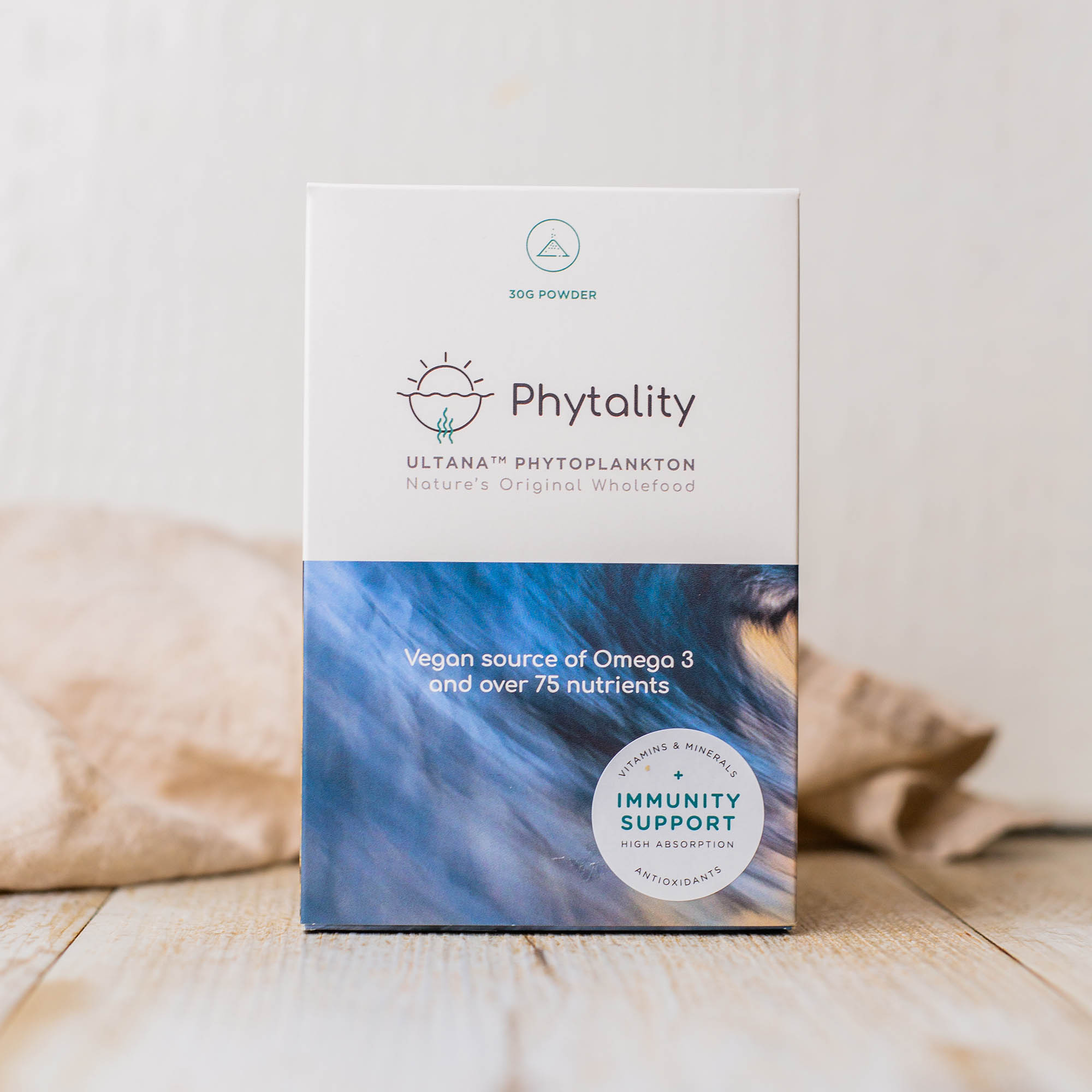
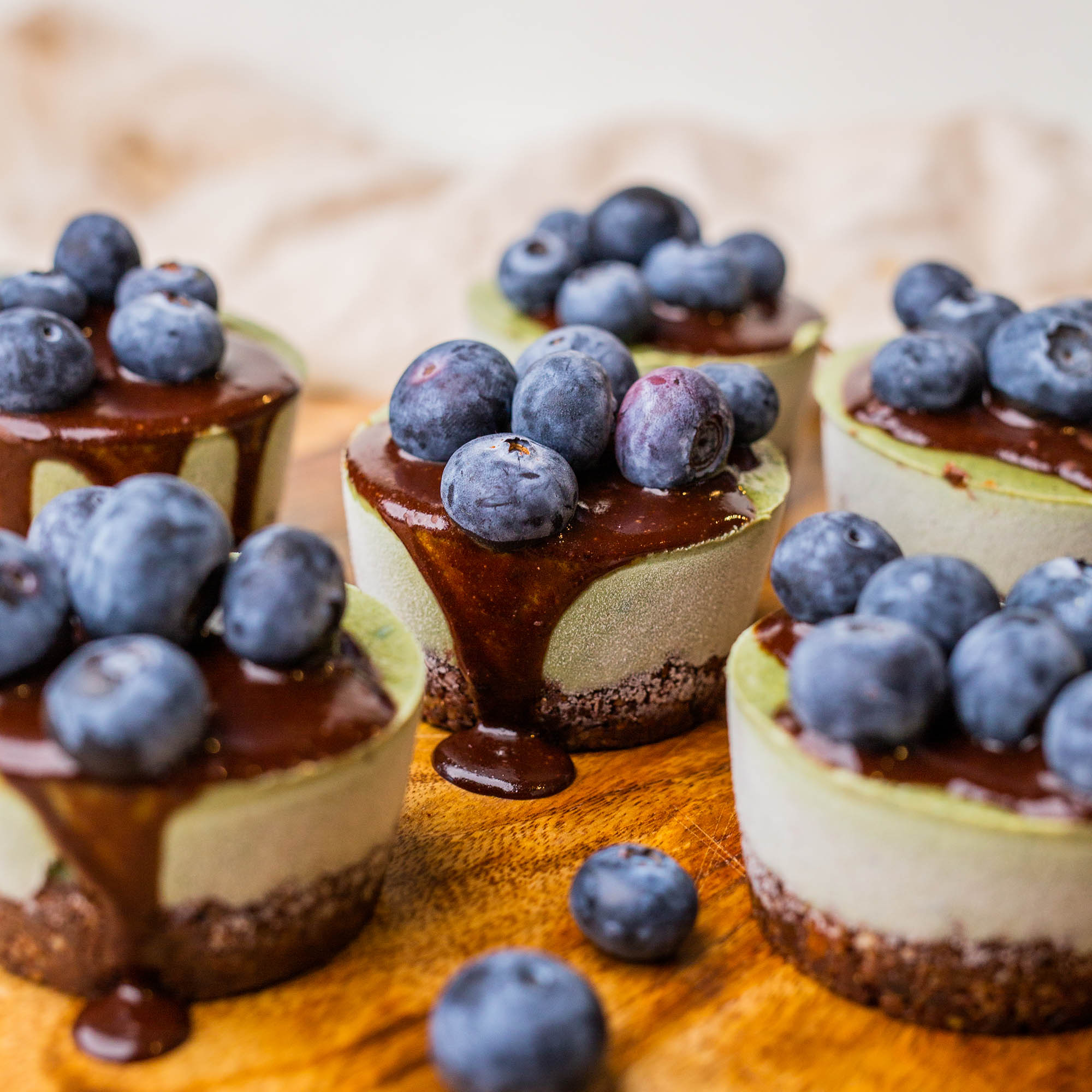
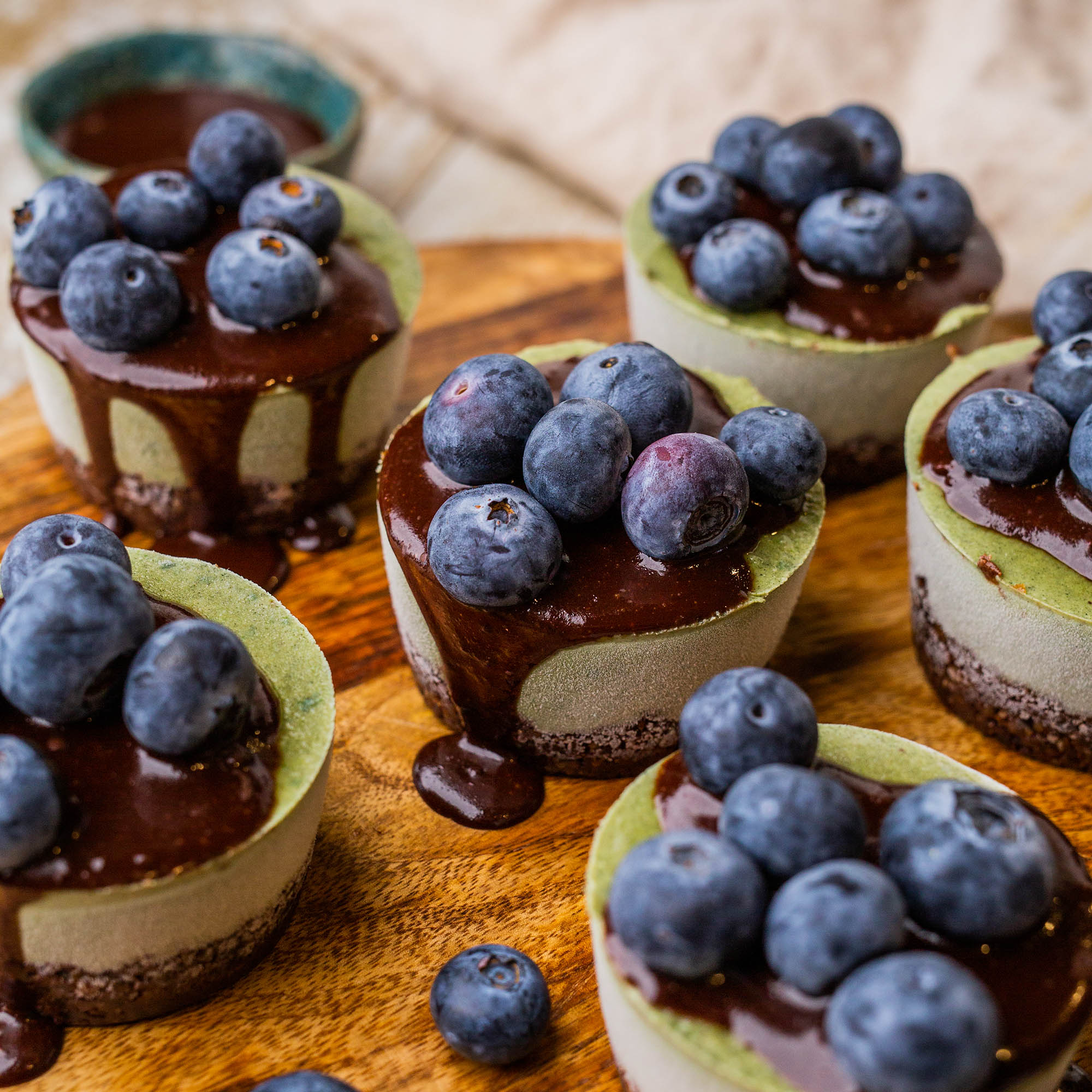
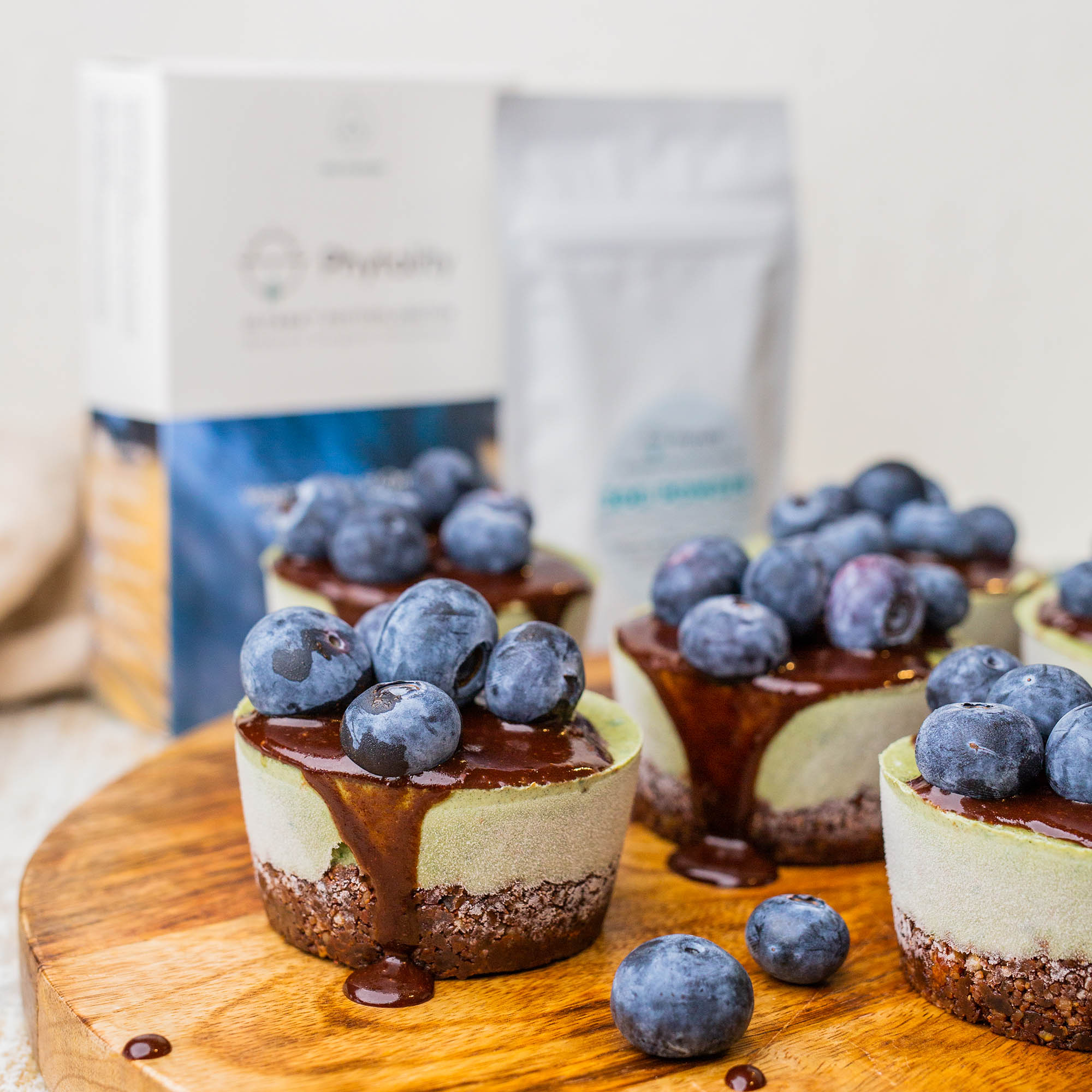
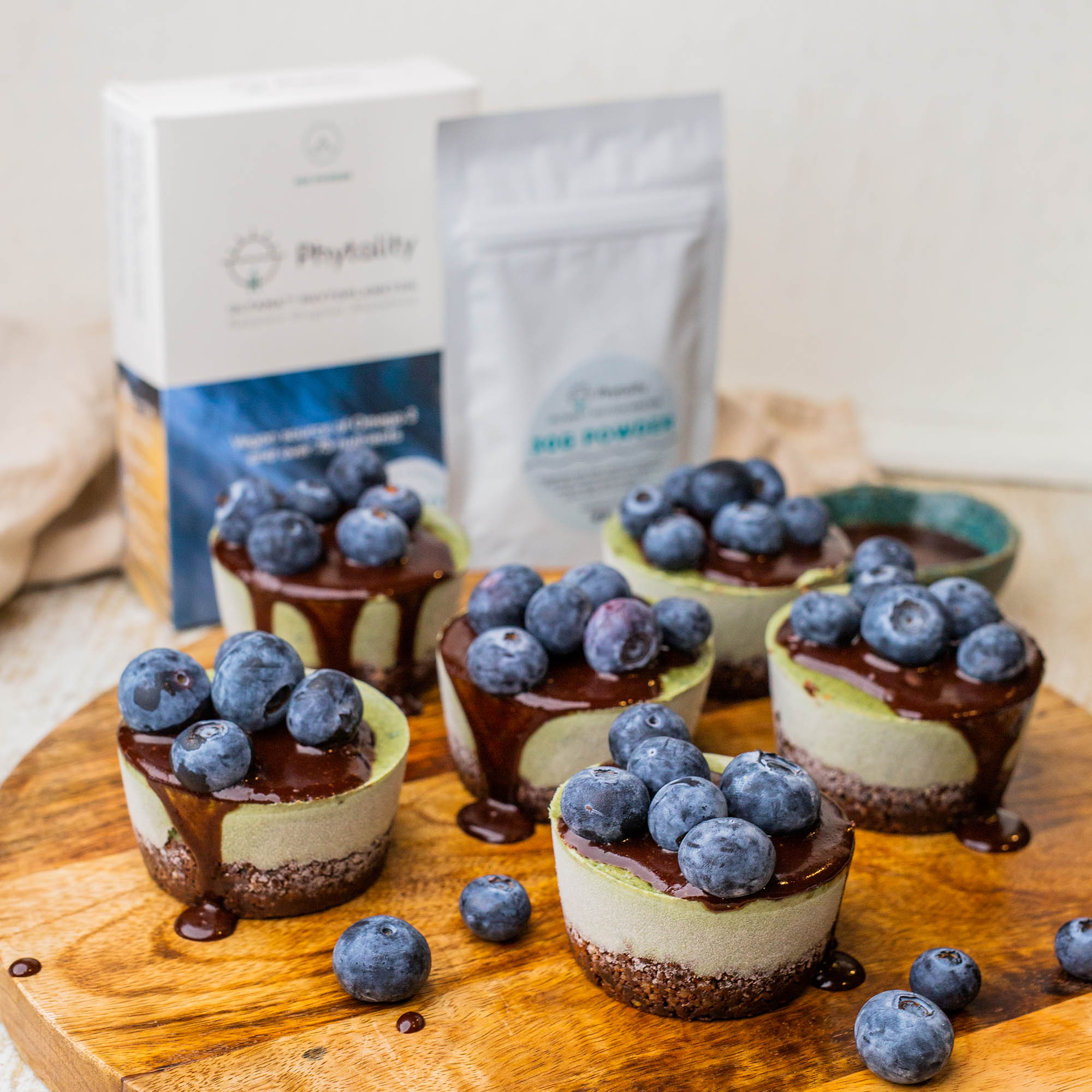
| Phytoplankton: The New Vegan Wholefood Alternative to Pre-natal Vitamins Plus Raw Vegan Choc Mint Cakes | Print |
- BASE:
- 1 cup walnuts
- 1 cup dates
- 2 TBSP cacao powder
- 1-2 tsp water if needed
- FILLING:
- 1½ cups cashews (soaked for 15 minutes in boiling water or soaked overnight)
- 200g can coconut cream
- 3 TBSP maple syrup
- juice ½ lemon
- a small handful of spinach for colour
- 4 drops peppermint essential oil or ¼ tsp peppermint extract
- 2 heaped tsp Phytality Phytoplankton
- CHOCOLATE COATING:
- 2 TBSP cacao powder
- 2 TBSP maple syrup
- 2 TBSP avocado oil
- For the base, process all ingredients in a food processor until sticky. Divide mixture and press down evenly into the base of large muffin tin. I used about 2 tbsp of the base for each muffin hole. I used a silicone muffin mould. If not using silicon, make sure to line your muffin tin holes with baking paper for easier removal. Set aside.
- For the filling add all the filling ingredients in a high-speed blender and blend until smooth. Pour out evenly over bases in the muffin tin and freeze for about 4 hours until set.
- Mix the chocolate sauce ingredients in a small bowl and spoon out over cakes once set. decorate with blueberries or toppings of choice.
References:
1.https://pubmed.ncbi.nlm.nih.gov/30845641/
2. https://pubmed.ncbi.nlm.nih.gov/19562864/
3. https://faseb.onlinelibrary.wiley.com/doi/full/10.1096/fj.201700692RR
4. https://www.ncbi.nlm.nih.gov/pmc/articles/PMC6470929/
5. https://pubmed.ncbi.nlm.nih.gov/28471488/
6. https://www.ncbi.nlm.nih.gov/pmc/articles/PMC6470702/
7. https://pubmed.ncbi.nlm.nih.gov/26773247/
8. https://www.ncbi.nlm.nih.gov/pmc/articles/PMC3607655/
9. https://www.ncbi.nlm.nih.gov/pmc/articles/PMC2989696/
10. https://pubmed.ncbi.nlm.nih.gov/29217669/
11. https://pubmed.ncbi.nlm.nih.gov/23134891/
12. https://pubmed.ncbi.nlm.nih.gov/17209208/










